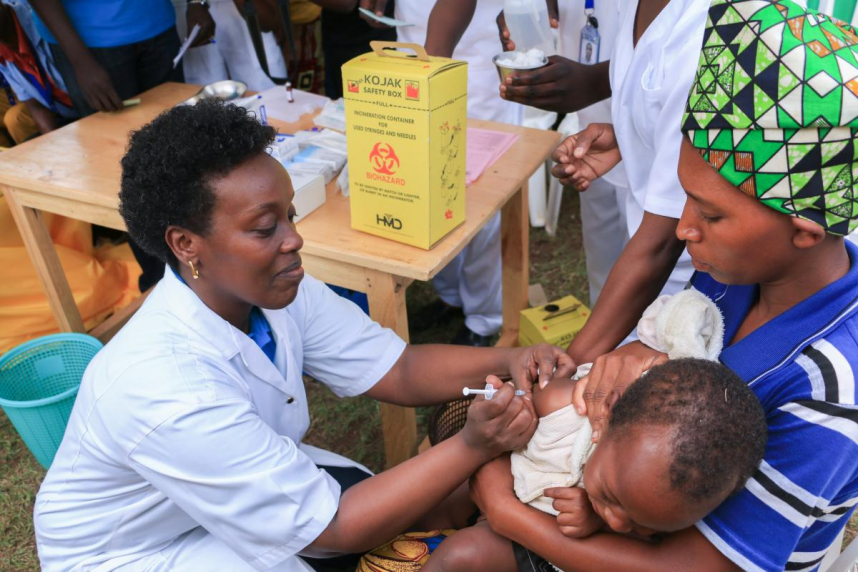
Clutching an umbrella, medical records, and her two-year-old daughter, Kani Fall negotiated the brown puddles lapping at the hospital gate, the final hurdle in a two-hour, rain-soaked journey to her nearest vaccination clinic in western Gambia.
Fall waited with dozens of mothers and babies in the flooded courtyard of Bundung Hospital. Then a doctor emerged with bad news. The hospital had run out of measles vaccines, and it wasn't clear when they would receive more.
"They told me there was no vaccine. But I am coming back," said Fall, 27, who had closed her catering business for the day to make the trip. "It's for my daughter, it's for her health," she added, fighting back tears of frustration.
The COVID-19 pandemic interrupted measles vaccine campaigns globally in 2020 and 2021, leaving millions of children unprotected against one of the world's most contagious diseases, whose complications include blindness, pneumonia, and death.
After what health experts call the biggest backslide in a generation, 26 large or disruptive measles outbreaks have sprung up worldwide, according to the World Health Organization. A devastating outbreak in Zimbabwe has killed more than 700 children this year, chiefly among religious sects that do not believe in vaccinations.
Now African health systems remain especially vulnerable due to a lack of funds and manpower, particularly in countries where conflict and malnutrition make children more vulnerable to deadly infection, according to Reuters interviews with more than a dozen disease experts, doctors, and global health officials.
"We've never seen the number of unimmunized children that we're seeing now," said Dr. Deblina Datta, head of the global measles elimination effort at the U.S. Centers for Disease Control and Prevention.
"I have stood at the bed of children dying from measles, and it's a shocking thing to see. And this is a preventable event."
There have been more than 45,000 reported cases in Africa this year, killing more than 2,300 people. That is double the number of cases at this time last year, when some lingering social distancing measures may have slowed infections.
The WHO and UNICEF launched an awareness and fundraising campaign in 2020 to cover gaps in inoculations caused by the pandemic, particularly in middle-income countries, but have raised almost no money, the agencies told Reuters.
The estimated shortfall for measles globally: is at least $255 million. COVID, the war in Ukraine, food shortages and inflation have squeezed donations from wealthier nations, the agencies said.
"Our current resources won't be enough should countries step up their requests for funding needed to respond to the increasing number of measles outbreaks," WHO spokesperson Margaret Harris said.
In a recent document shared with governments and health organizations and reviewed by Reuters, WHO outlined 15 vaccination campaigns that should be starting in Africa in 2022 and 2023. But an October update showed that only three of these campaigns had specific start dates. The rest were marked either 2022 or 2023, then "??" in the month and day section, by the WHO team.
Health officials at Bundung Hospital in Gambia said the measles vaccine shortage there was temporary, the result of a bump in demand for routine immunizations following the end of a health workers' strike in July.
But it highlights how precarious underfunded health systems can be in countries already overstretched by COVID. Dozens of measles cases have cropped up in Gambia this year, a spike over previous years. The country last had a national "catch-up" campaign in 2015 to reach families in more remote areas that are unlikely to bring their children in for routine vaccination.
Another was due in 2020 but resources were directed towards COVID that year, said Shahid Mahbub Awan, child survival and development manager at UNICEF Gambia. Routine immunization coverage for pediatric vaccines across the board fell from 93% in 2018 to 66% in 2020, Awan said.
"It was like a full stop. One day everything was happening and the next day it wasn't," he said.
The measles campaign was rescheduled for 2021, but in July of that year, polio was detected in a water sample. Without the resources for parallel campaigns, health authorities prioritized polio. A national measles catch-up campaign was due for October.